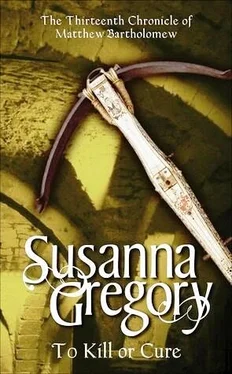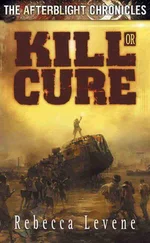Unfortunately, it meant he was later leaving Zachary Hostel than he had intended. It was already dark, and most people were asleep in their beds. He glanced around uneasily. He was not worried about being fined by beadles for being out after the curfew had sounded – it would be annoying to give them fourpence, but he was a wealthy man and would not miss it – but Cambridge was an uneasy town, and he did not want to be attacked by apprentices who would love to corner a lone scholar and teach him a lesson.
It was not far to Clare, so he lengthened his stride, aiming to be home as quickly as possible. He had just reached the overgrown tangle that was the churchyard of St John Zachary when a shadowy figure emerged from the bushes. It was a moonless night, so Wenden could not tell whether the cloaked shape was scholar or townsman, male or female. He was about to order the person out of his way when there was a blur of movement. He felt something enter his stomach, but there was no pain, just a cold, lurching sensation. He dropped to his knees, aware of something protruding from his innards – an arrow or a crossbow bolt. He toppled forward slowly. The last thing he heard was the rustle of old leaves as his assailant melted back into the undergrowth.
Easter Day (April) 1357
Michaelhouse was not the University at Cambridge’s most wealthy College. It suffered from leaky roofs, faulty gutters, rising damp and peeling plaster. Worse yet, its Fellows and students were sometimes obliged to endure the occasional shortage of food when funds had to be diverted to more urgent causes – such as paying carpenters and masons to stop some part of the ramshackle collection of buildings from falling down about their ears.
Yet life was not all scanty rations and dilapidated accommodation. When Michaelhouse had been founded some thirty years before, one benefactor had predicted that its scholars might appreciate an occasional chance to forget their straitened circumstances. He had gifted them a house, and stipulated that a portion of the rent accruing from it was to be spent on special Easter foods and wines; in return, the scholars were to chant masses for his soul each morning in Lent.
The Michaelhouse men had kept their end of the bargain and, after the Easter Day offices had been sung, they hurried home to see what the bequest had brought them that year. Unexpected subsidence under the hall – which had proved expensive to rectify – meant the Master had been obliged to enforce the Lenten fasts more rigorously than usual, and everyone was eagerly awaiting the feast. Matthew Bartholomew, the College’s Master of Medicine, had never seen his colleagues move so fast, and any semblance of scholarly dignity was lost as they raced through the gate in anticipation of their benefactor’s generosity.
However, the meal was not quite ready. Agatha, the formidable laundress who had taken it upon herself to run the domestic side of the College, tartly informed the Master that the servants so seldom cooked such monstrous repasts, they had miscalculated the time it would take and there would be a short delay. Technically, Agatha should not even have been inside the College, let alone allowed to wield so much power – the University forbade relations between its scholars and women, on the grounds that such liaisons were likely to cause problems with the town. But Agatha had been employed there for more than two decades, and it would have taken a braver soul than anyone at Michaelhouse to oust her now.
Restlessly, the Fellows and their students milled about, waiting with ill-concealed impatience for her to finish. Delicious scents began to waft across the yard, almost obliterating the usual aroma of chicken droppings and stagnant water. To pass the time, Bartholomew looked around at the buildings that had been his home for the best part of thirteen years.
The heart of Michaelhouse was its hall, a handsome structure with oriel windows gracing its upper storey; the smaller, darker chambers on the ground floor were used as kitchens, pantries and storerooms. At right angles to the hall were the two ranges that comprised the scholars’ accommodation. The northern wing boasted twelve small rooms, arranged around three staircases, while the newer, less-derelict southern wing had eleven rooms with two staircases between them. Opposite were the main gate, porters’ lodge and stables. Combined, the buildings formed a square, set around a central yard, all protected by sturdy walls. Cambridge was an uneasy place at the best of times, and no academic foundation risked being burned to the ground by irate townsmen for the want of a few basic defences.
That morning the sun was shining, and it turned Michaelhouse’s pale stone to a light honey-gold, topped by the red tiles of its roofs. Agatha had planted herbs in the scrubby grass outside the kitchens, and their early flowers added their own colour to the spring day. Hens scratched contentedly among them, jealously guarded by a scrawny cockerel. Also present was a peacock, which was owned by Walter the porter. Walter’s surly temper was legendary, and Bartholomew suspected the only reason he had formed an attachment to the magnificent but deeply stupid bird was its unpopular habit of screaming in the night and waking everyone up.
Eventually, Bartholomew’s book-bearer, Cynric, walked towards the bell, intending to chime it and announce the meal was ready. He could have saved himself the effort. The moment he reached for the rope, there was a concerted dash for the hall. Students jostled each other as they tore up the spiral staircase; Fellows and commoners – young hopefuls who helped with teaching, or ‘retired’ men too old to work – followed a little more sedately, although only a very little. It was not just the junior members who were hungry that morning.
The hall had been transformed since Bartholomew had seen it the night before. Its floor had been swept, and bowls of dried roses set on the windowsills to make it smell sweet. Its wooden tables had been polished, and the usual battered pewter had been replaced by elegantly glazed pots and the College silver. A fire flickered in the hearth and braziers glowed on the walls, lending the room a welcoming cosiness – the Easter benefaction included an allowance for fires and lamps, which was a rare luxury for anyone. Some of the food was stacked near the hearth, being kept warm – or drying out, depending on whose opinion was asked – while the rest sat on platters behind the serving screen at the far end.
The Fellows trooped to the high table, which stood on a dais near the hearth, and the students and commoners took their places at the trestle tables and benches that had been placed at right angles to it. Michaelhouse was a medium-sized foundation. Its Master presided over seven Fellows, although two were currently away, and there were ten commoners and thirty students.
‘A whole sheep!’ crowed Brother Michael, rubbing his hands together in gluttonous anticipation. He was a Benedictine monk, and by far the fattest of the Fellows, despite shedding some weight the previous year. ‘And I count at least two dozen fowl.’
‘Oh, dear,’ whispered Father Kenyngham, the oldest member of the gathering. He had been Michaelhouse’s Master until four years before, when he had resigned to concentrate on his teaching and his prayers. He was a Gilbertine friar, whose gentle piety was admired throughout the University, and many believed he was a saint in the making. ‘How are we supposed to eat all this?’
‘I foresee no problem,’ said Father William, a sour Franciscan famous for his bigoted opinions and dogmatic theology. He was as unpopular as Kenyngham was loved. ‘In fact, I would say there is less here this year than there was last. Prices have soared since the Death, and a penny does not go far these days.’
Читать дальше












